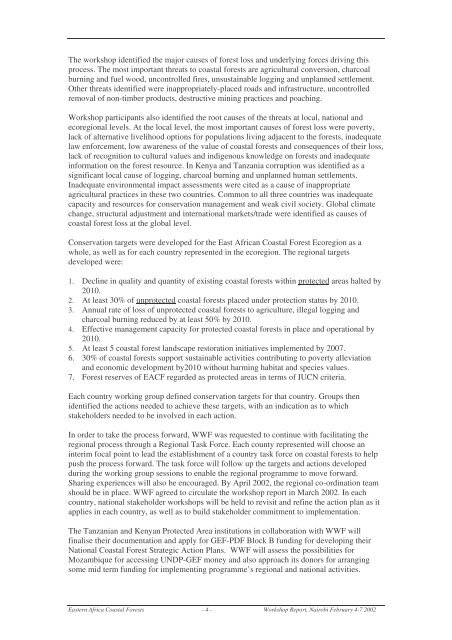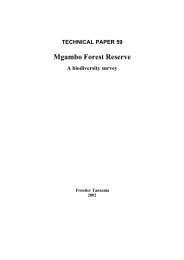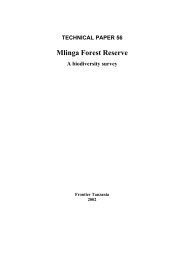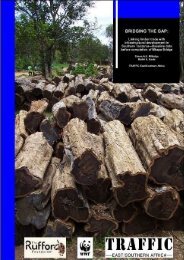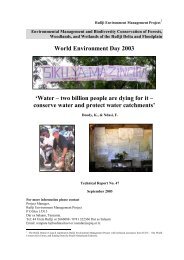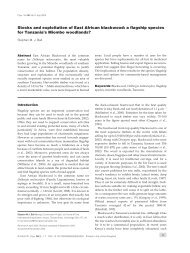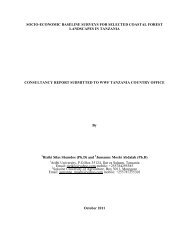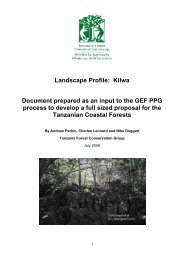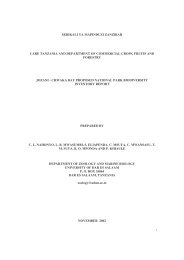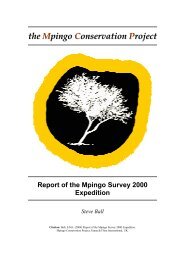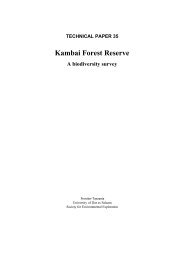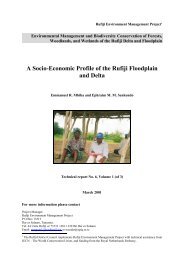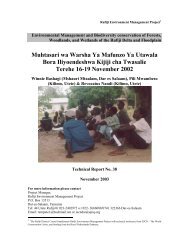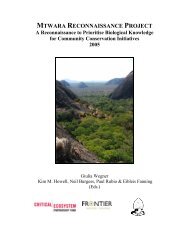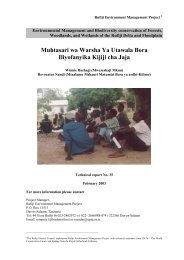Eastern Africa Coastal Forest Programme: Regional Workshop ...
Eastern Africa Coastal Forest Programme: Regional Workshop ...
Eastern Africa Coastal Forest Programme: Regional Workshop ...
You also want an ePaper? Increase the reach of your titles
YUMPU automatically turns print PDFs into web optimized ePapers that Google loves.
The workshop identified the major causes of forest loss and underlying forces driving this<br />
process. The most important threats to coastal forests are agricultural conversion, charcoal<br />
burning and fuel wood, uncontrolled fires, unsustainable logging and unplanned settlement.<br />
Other threats identified were inappropriately-placed roads and infrastructure, uncontrolled<br />
removal of non-timber products, destructive mining practices and poaching.<br />
<strong>Workshop</strong> participants also identified the root causes of the threats at local, national and<br />
ecoregional levels. At the local level, the most important causes of forest loss were poverty,<br />
lack of alternative livelihood options for populations living adjacent to the forests, inadequate<br />
law enforcement, low awareness of the value of coastal forests and consequences of their loss,<br />
lack of recognition to cultural values and indigenous knowledge on forests and inadequate<br />
information on the forest resource. In Kenya and Tanzania corruption was identified as a<br />
significant local cause of logging, charcoal burning and unplanned human settlements.<br />
Inadequate environmental impact assessments were cited as a cause of inappropriate<br />
agricultural practices in these two countries. Common to all three countries was inadequate<br />
capacity and resources for conservation management and weak civil society. Global climate<br />
change, structural adjustment and international markets/trade were identified as causes of<br />
coastal forest loss at the global level.<br />
Conservation targets were developed for the East <strong>Africa</strong>n <strong>Coastal</strong> <strong>Forest</strong> Ecoregion as a<br />
whole, as well as for each country represented in the ecoregion. The regional targets<br />
developed were:<br />
1. Decline in quality and quantity of existing coastal forests within protected areas halted by<br />
2010.<br />
2. At least 30% of unprotected coastal forests placed under protection status by 2010.<br />
3. Annual rate of loss of unprotected coastal forests to agriculture, illegal logging and<br />
charcoal burning reduced by at least 50% by 2010.<br />
4. Effective management capacity for protected coastal forests in place and operational by<br />
2010.<br />
5. At least 5 coastal forest landscape restoration initiatives implemented by 2007.<br />
6. 30% of coastal forests support sustainable activities contributing to poverty alleviation<br />
and economic development by2010 without harming habitat and species values.<br />
7. <strong>Forest</strong> reserves of EACF regarded as protected areas in terms of IUCN criteria.<br />
Each country working group defined conservation targets for that country. Groups then<br />
identified the actions needed to achieve these targets, with an indication as to which<br />
stakeholders needed to be involved in each action.<br />
In order to take the process forward, WWF was requested to continue with facilitating the<br />
regional process through a <strong>Regional</strong> Task Force. Each county represented will choose an<br />
interim focal point to lead the establishment of a country task force on coastal forests to help<br />
push the process forward. The task force will follow up the targets and actions developed<br />
during the working group sessions to enable the regional programme to move forward.<br />
Sharing experiences will also be encouraged. By April 2002, the regional co-ordination team<br />
should be in place. WWF agreed to circulate the workshop report in March 2002. In each<br />
country, national stakeholder workshops will be held to revisit and refine the action plan as it<br />
applies in each country, as well as to build stakeholder commitment to implementation.<br />
The Tanzanian and Kenyan Protected Area institutions in collaboration with WWF will<br />
finalise their documentation and apply for GEF-PDF Block B funding for developing their<br />
National <strong>Coastal</strong> <strong>Forest</strong> Strategic Action Plans. WWF will assess the possibilities for<br />
Mozambique for accessing UNDP-GEF money and also approach its donors for arranging<br />
some mid term funding for implementing programme’s regional and national activities.<br />
<strong>Eastern</strong> <strong>Africa</strong> <strong>Coastal</strong> <strong>Forest</strong>s - 4 - <strong>Workshop</strong> Report, Nairobi February 4-7 2002


